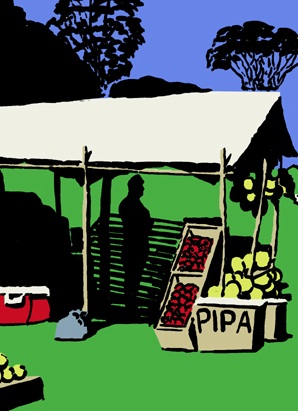
Contact me Go to home page Return to main travel page
Costa Rica
2011
*
Michael Kluckner
| "I'm
afraid of nothing happening, of experiencing nothing. That is
what the
modern traveller fears .... Emptiness." – Colin Thubron, Shadow of the Silk Road. 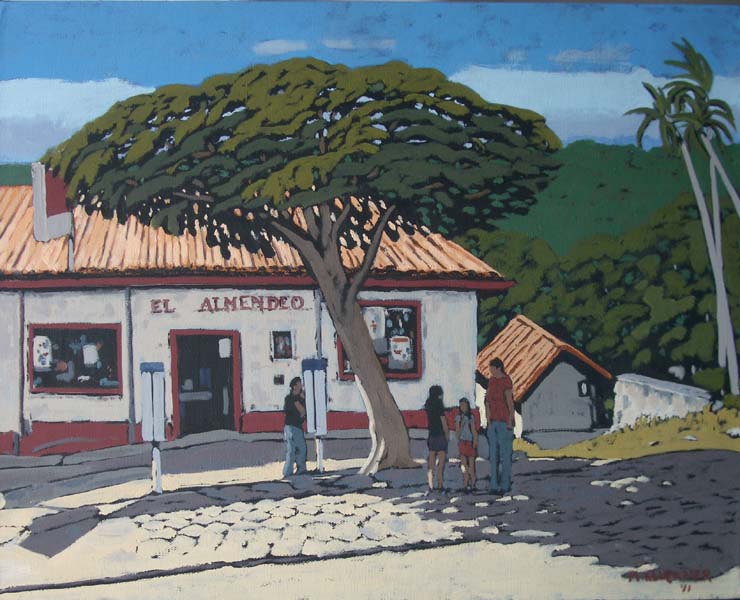 |
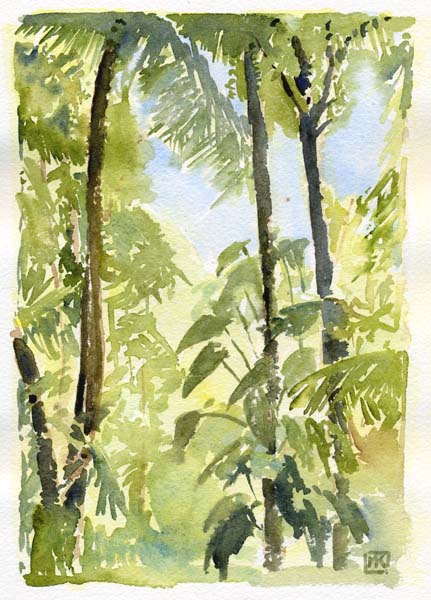 |
Above:
a store with a bus stop in the tablelands above Atenas; it was a
bus stop because locals knew the bus would stop there, not
because of
any signs, and the store wore its Coca-Cola colours proudly. Escaping Vancouver's gloomy winter, we spent the last half of January in peaceful, tropical Costa Rica thanks to our friends Howard and Ann, who loaned us their cottage in the highlands near Atenas, a coffee-growing town about an hour west of San José, the capital city. The democratic, well-educated "Ticos" have no army (they abolished it 60 years ago), universal health care and typically a modest middle-class lifestyle, especially when compared with their northern neighbours in Nicaragua, El Salvador and Honduras. So "nothing happens" in Thubron's sense – there's little chance of being mugged or murdered or witnessing the extremes of human misery, which rather takes the edge off it. The biggest employer is an Intel chip plant; more traditional industries that define the landscape include coffee grown on the steep terraced hillsides, cane sugar and palm oil. Costa Rica is a very mountainous country, with a real humidity break between the steaming jungles near the coast and the beautiful tablelands – National Geographic some years ago described Atenas as having the best climate in the world ('el mejor clima del mundo,' announced several roadside signs). The country is known worldwide for its environmental consciousness and its diverse wildlife, none of whom will stand still for a painter; as is usual for me, I was more interested in the people and their vernacular buildings while savouring the flickering impressions of passing butterflies, parrots and hummingbirds. I carried a pencil sketchbook and took some brush and ink materials and watercolour but didn't produce a huge amount of work. It was a very laid-back sojourn! After our return, I added "comic book colour" to the two brush and ink (black and white) drawings below with Photoshop and painted the two small oils. |
On
the road....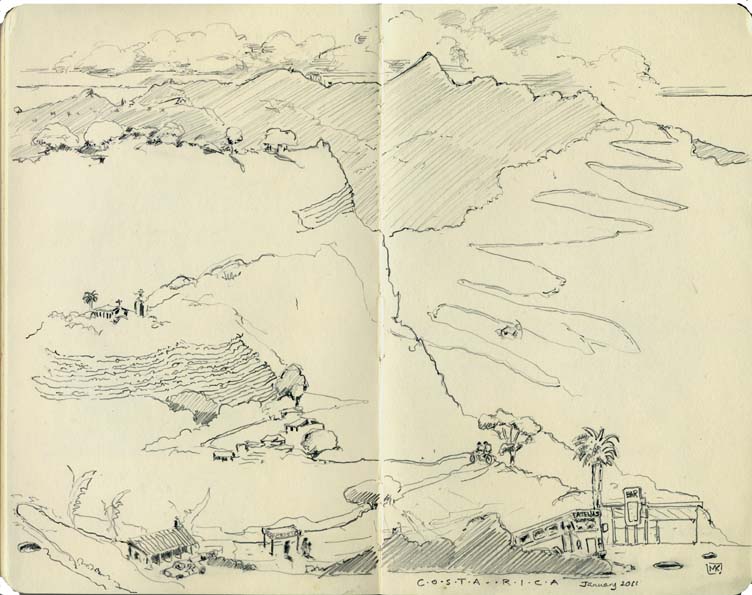 Above: first day we drove the incredible switchback roads over the mountain to Palmeres. Motorbikes, dogs on the roadsides, buses occupying 9/10s of the narrow pavement and killer potholes.... Always in the blue distance are mountains, covered in jungle right to their peaks, their conical shapes betraying their volcanic birth. 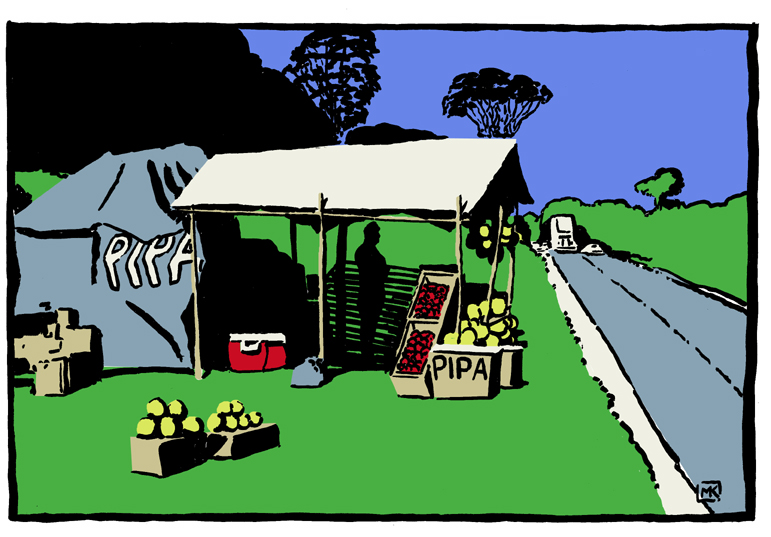 Classic roadside fruit stands and little stores. Pipa is a fruit (a loquat, according to Wikipedia, another word I've never heard) 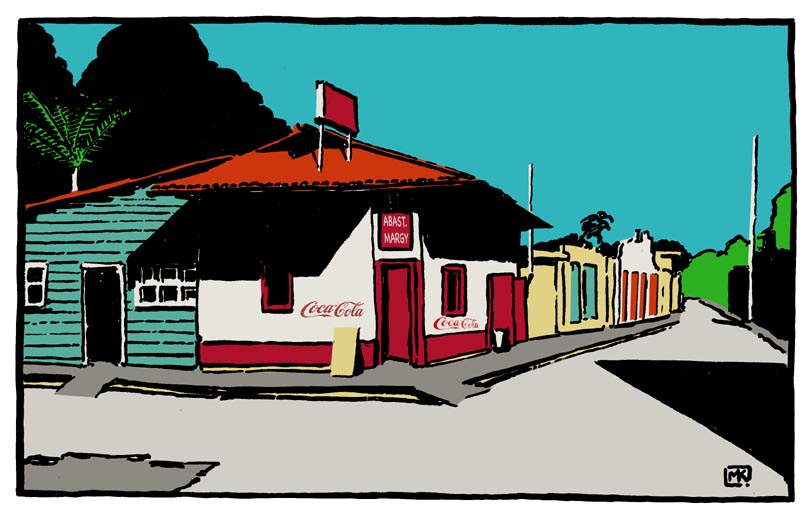 On the beach.... 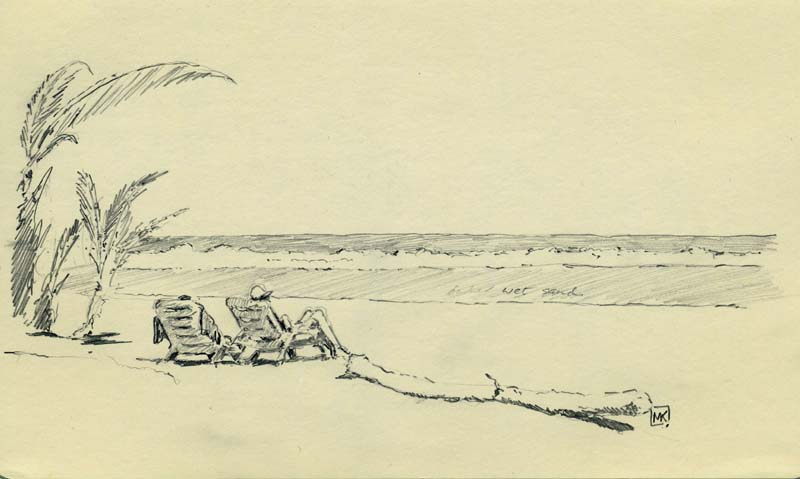 Not being beach people anymore, we briefly visited the Pacific Coast shoreline from Jaco south and didn't try to fight the traffic on the Panamerican highway over to the Caribbean coast. The beaches were beautiful although notorious for their rips, and you wouldn't want to be on one like Esterillos above when a tsunami was coming in. At the jewel-like Parque Manuel Antonio, below, there are perfect tropical coves lined with palms and huge jungle trees like a Swiss Family Robinson fantasy. But it was breathlessly hot – we entered the park at dawn and by 10 in the morning the air was sticky and thick, the ocean offering little relief as it was the temperature of an English boarding-house bathtub. 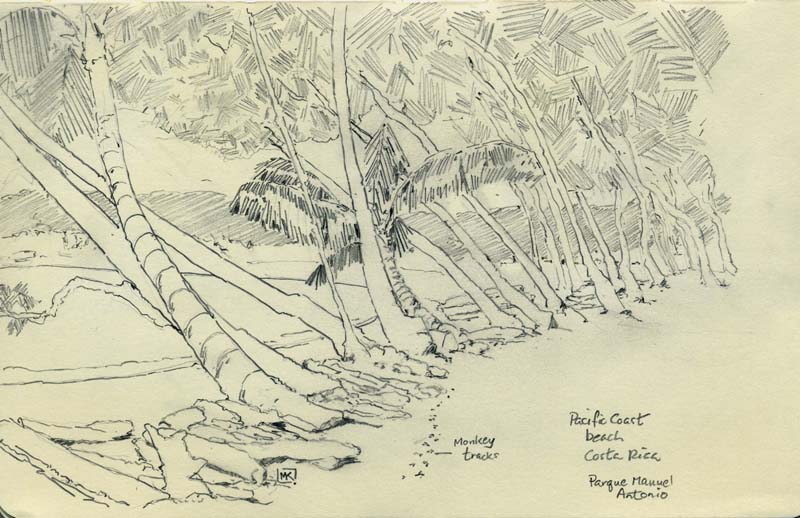 Villages .... 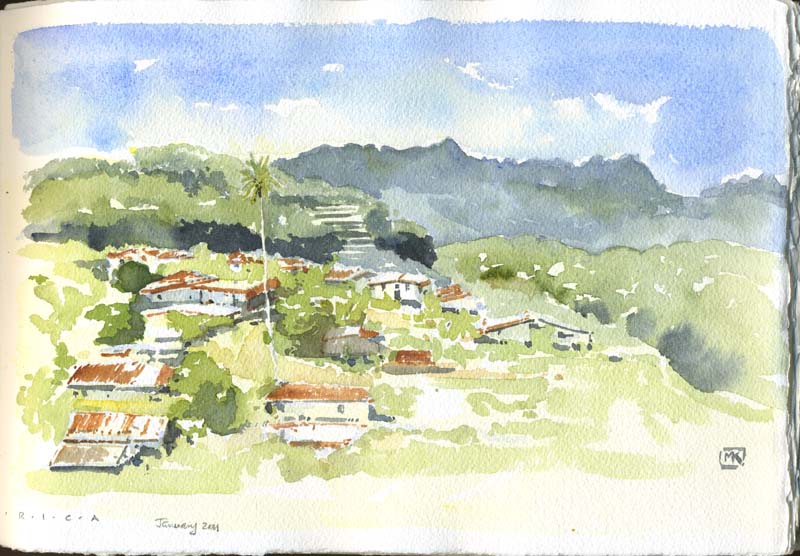 Above: the Tico villages straggle randomly over the hilly ground, usually without a grid or any evident land division, connected by narrow tracks. The houses are modest by North America standards; the oldest are wooden with horizontal board siding and galvanized tin roofing, more recent ones are typically concrete block rendered over with stucco and terracotta tile roofs. People have cars, cell phones and lots of jeans and T-shirts so they don''t look much different on the surface from Hispanic Americans or urban Mexicans. Below: the jarring contrast is the slums said to be of the "Nicos" (Nicaraguan refugees escaping the ongoing civil war/dictatorship just to the north). This one had sprung up on the edge of the river at Jaco, the coastal resort where many people from the capital city escape for weekends. 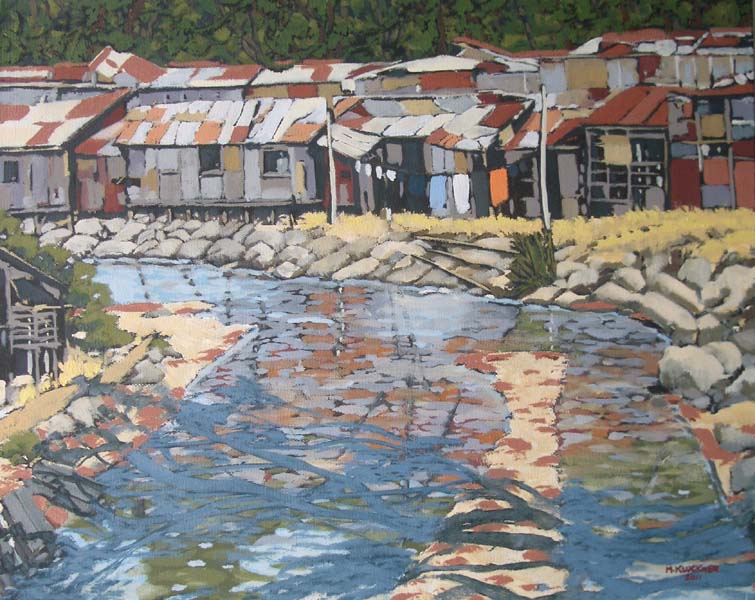 The Atenas bus depot and its Sodas .... 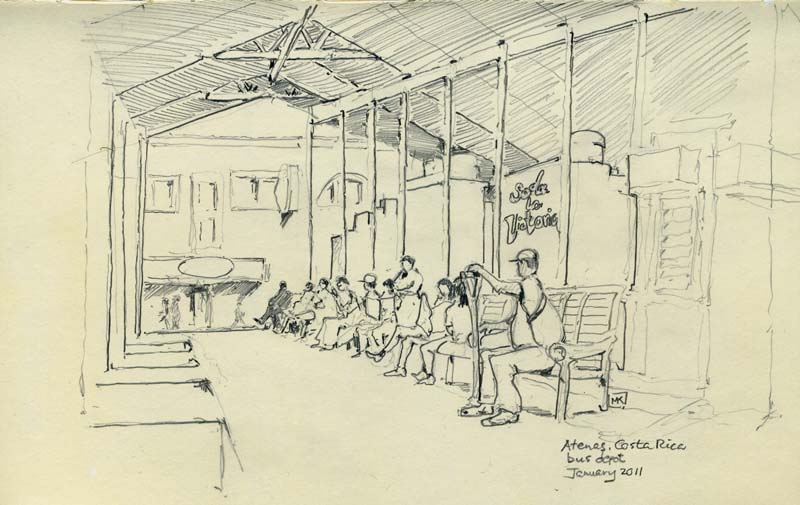 As in previous trips such as the one to Spain and France in 2008, I found the bus depots, with their ceaseless motion of local people travelling from town to town, great places to sit and draw. The Atenas bus depot had it all: mobs of people, a couple of dozen market stalls for produce and meat, and several "sodas," cafes in Tico-speak. Every soda offered el casado – the universal "married man's lunch" of beans, rice, salad, a small portion of chicken or fish or beef and a slice of fried plantain – for a few dollars (casado means married), as well as the usual staples of fast-food places everywhere, hot dogs and burgers. 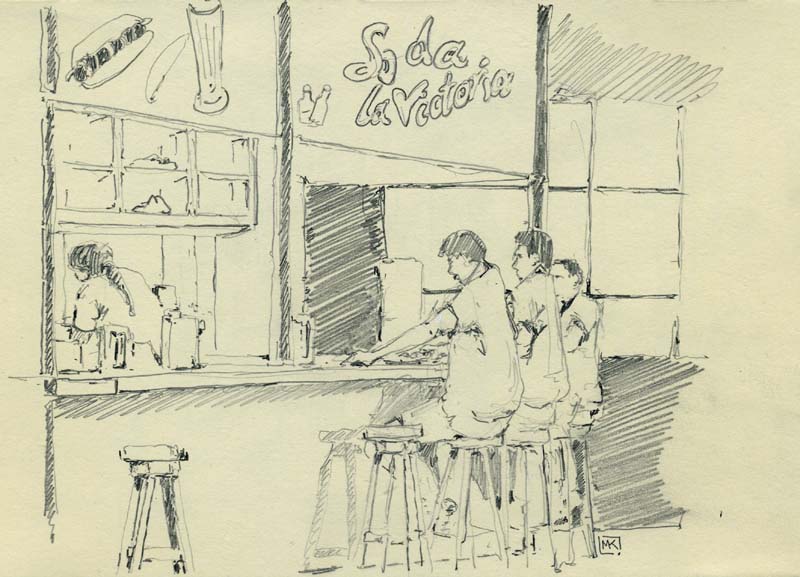 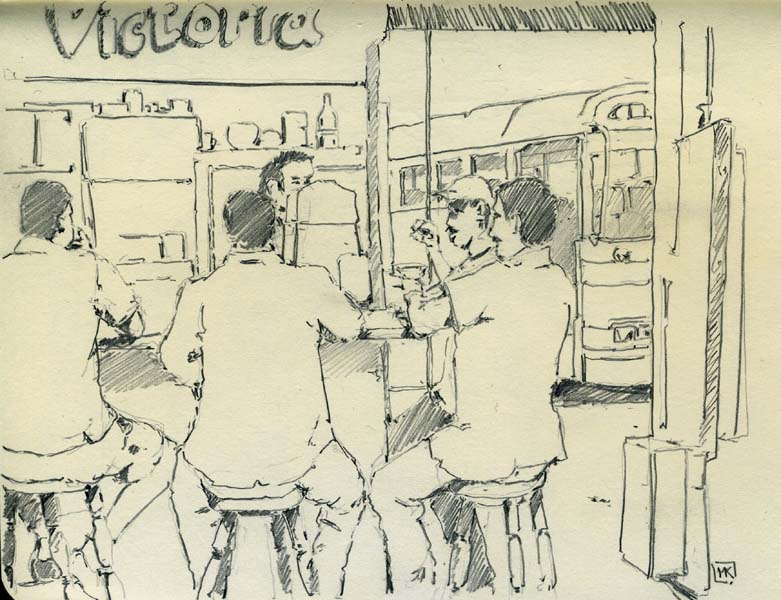 Long views.... 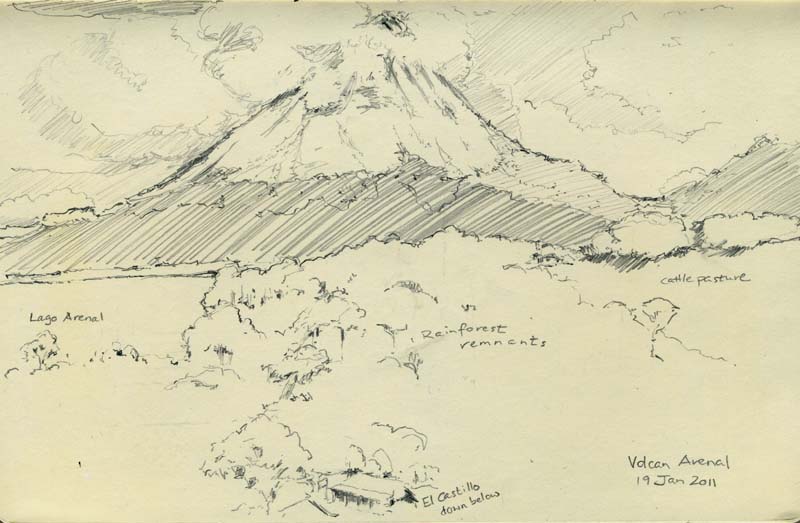 My pencil drawings while travelling have evolved into annotated aides-mémoire, partly because I can't see painting large pictures of long views like the ones here, partly because photographs flatten space and lose detail in the haze. Sometimes a word or two is worth a thousand pictures. The peak of Volcan Arenal (above) was all but hidden in clouds on the day we were there, but mesmerizing nonetheless; unfortunately, it has refused to puff smoke and lob boulders in the last few years so the local businesses have fallen on hard times. The image below is from a "mirador" cafe on the road to Volcan Poas, the national park quite close to the capital city. 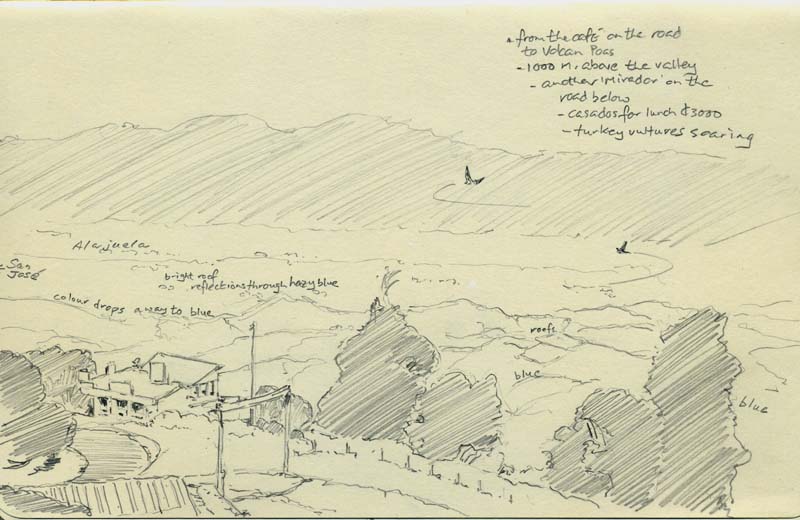 Emails to our daughter: All is going well for us here. Yesterday was a hot day with that stickiness that reminded me of Sydney. We went off over the mountain on one of the narrow, switchback roads that are characteristic here to Palmeras, a town that was having its annual fiesta. Iguanas eating lettuce in the park, the church packed full of people who then went to the fiesta and got blasted, a cheerful sort of chaos to it all. Yesterday evening we went briefly into Atenas, our closest town that is still a good 5 or 6 km away, as a group of people were doing a sort of communal drumming in the local park. Sounds like it would be awful, but in fact it was about 30 people in a circle, including children, playing a rather quiet, rolling rhythm while children played and lovers strolled. It gets dark here before 6 but the evenings are very warm and calm. Atenas claims "the best climate in the world" because it cools down so well at night -- we're up in the hills. We stopped at a restaurant just down the road from home and had excellent casados (a complete meal of rice, beans, salad and plantain with a little piece of chicken) for $4. With beer it came to $6. The Ticos are the Costa Ricans, the Nicas the neighbouring Nicaraguans who are allegedly the source of all the country's problems. We're heading into San José, the capital and biggest city, this morning and are going to take a historic walking tour with an American woman who's settled here. That should allay some of the fears from the guidebook about muggings and other crime and show us what are the areas worth further exploring. Howard goes back to Canada tomorrow morning. We will probably set off Wednesday for the volcano parks to the north. ----- We never made it to the walking tour. We were in deep traffic in the centre of San José, stopped at a red light, when ... bang! Rear-ended by an idiot who had shot around a bus into what he thought was a gap. Fortunately no damage to anything other than Howard's rented car. I couldn't get out my side as the traffic was so tight against us I couldn't even open the door. Instantly the whole street was a deafening din of honking horns and Howard moved to get the car across to an indent in the curb – a pick-up zone for the city's main hospital, appropriately. Bad move – the guy who hit us took the opportunity to U-turn and head off in the other direction, but fortunately the eagle-eyed Christine in the back seat memorized the license number long enough to relay it to me (with pencil and notebook ready). We made it back to the rent-a-car place where poor Howard was beaten up verbally for moving the car without first contacting the traffic police. The world is supposed to stop because you've had an accident and you're supposed to notify the police instantly whether you have a phone or not. After a half hour or so it was sorted out and we headed off back toward home in a different Toyota, with the assurance that the culprit would be nabbed by the police asap due to C's vigilance. In retrospect we all should have jumped out with our cameras and recorded it. This is an argument for having full insurance on a rent a car, even though it costs more than the car itself. And perhaps we will psych ourselves up for another trip into San José for a walking tour. However, our glimpse of the city did not impress: an incredible crush of people, kiosks against narrow sidewalks, an endless push of traffic. If we can figure out how to get a bus from Atenas into it we'll probably do that. Atenas is a lot nicer. Crazy place. Loco todos las horas, or should it be "para siempre." The private company who picks up the garbage in front of Howard's house one or twice a week (not sure which days) tosses a crumpled piece of paper over the fence which turns out to be their invoice. We were laughing about that but, as Howard said, his land tax form arrived the same way – a crumpled-up piece of paper tossed over the fence! And there are wonderful stories in the Tico Times, the local English language paper, about people buying cars and it taking weeks to get them registered, requiring the assistance of lawyers, of cars that had been underwater for two months in New Orleans being smuggled in and fixed up for resale, of people taking years to get permits to build houses. Howard was fortunate in that his house was home to a horse before he got it, so at least it was a reno that he was able to do with local help not involving numerous government departments. Another amusement was Howard's attempt to get the electricity bill transferred into his name. They couldn't do it without the signature of the previous owner, who had died, and suggested he stop paying the bill which would mean they would cut the power off after a few months. Then he could apply for a reconnection under his own name. He was unwilling to do it, figuring he might be without power for several months. So after our traffic accident we made it back home for a late lunch and then decided to drive to Jaco on the Pacific Coast, about 40 minutes away through spectacular mountain scenery. We agree that we have never seen a place this steep, this precipitous, other than Crete. Coffee plantations on terraced hillsides, jungle pushing into everything and thick, steamy heat. We crossed the famous bridge that Paul mentioned from his trip here and walked back to the mid point to look at the crocodiles basking in the mud below. We counted about a dozen. Then on to the resort towns for a brief look and a mango ice cream. Surf so-so, grey sand, jungly headlands framing the beach, fairly cloudy sky, a few babes and dudes – it could have been Queensland. Bought mangos on the roadside, drove through a thunderstorm and bought chicken for six (there were just three of us) for about $4 at a carneceria in Atenas, came back and got into the jacuzzi with the view over the valley (a bit too late for sunset this time), barbecued the pollo and then watched in the distance some fireworks, probably celebrating the last Monday in the week. It has cooled down to delicious evening air – el mejor clima del mundo, if I've got their grammar correct. A tough life. ---- We've been fine since the last zot of email. Howard headed for home at the crack of dawn Tuesday leaving us in charge of his very pleasant 800 square foot house. We headed out Wednesday early for Volcan Arenal a fair drive to the north. Went through utterly spectacular country. On the steeper slopes cattle had worn little terraces to allow them to graze without evolving short legs on one side, even steeper ones were used for coffee plantations with the locals working patiently in them. The local coffee is about $3 for a fair-sized bag, by the way. Some roads were very pleasant to drive with almost no traffic, then we'd hit one that looked no different from the quiet one and would find it plugged with buses and trucks. This is not a country where you can count on covering distance in a definable amount of time. The local part of the legendary Panamerican highway that goes all the way north to Lund, BC, is an unbelievable stream of traffic with no verges and no passing lanes. The volcano was, alas, quiet, but spectacular nonetheless and we found ourselves staring at it for much of an afternoon as the clouds swirled around its peak, then walked around the tiny town we were staying (El Castillo), watching hummingbirds feeding in the bushes and the vultures soaring overhead. Very pleasant place to stay. The following day we did a "hanging bridges" walk through the rainforest not too far away and then worked our way along Lago Arenal (a hydro dam-made lake); much of what was supposed to be there had closed up, perhaps due to the lava interruptus. The tourist dollars are pretty fickle and, of course, if the volcano were really active everybody's hotels would be wiped out, so they can't win, can they? Today we explored locally, to another volcano! Volcan Poas, in a national park not too far from here, was really worth the trip, as were the towns nearby. It's strawberry season and we bought a bag and some local cheese from roadside stands (the latter very reminiscent of the salty rubbery cheese of poutine). A good day but we're thrashed by the driving. Never been on more narrow switchback roads. Maybe tomorrow we'll brave the local bus and head into San Jose if it turns out to be market day. ----- Back at the rancho after a couple of days down the coast, we realize how Atenas got dubbed the "best climate in the world" by National Geographic in the '90s. It is cool here in the evenings (the resident gecko just stuck its head through a gap in the trim along the edge of the ceiling), hot but not humid during the day, so different from what we experienced during our jaunt as far as the Manuel Antonio national park about 3 hours south of here. There are beaches along the way to die for, the Playa Estrillos in particular that runs for miles with nobody on it. We've seen deserted beaches in Oz but this one took the prize -- it was flat with an intertidal more than a hundred metres wide with the kind of skin of water on it that you could kitesurf from, a good surf, lined with palms, with weekender-type villas owned by Ticos from San José and a few small hotels like one where we stopped for lunch. You wouldn't want to be there when a tsunami arrived, but .... The road then swung a little ways inland through miles of African oil palm plantations that were established when the area had a banana blight 50 or so years ago; some incredible scenes, like a line of carts pulled by oxen heading out to harvest the 60-kg. seed pods. Eventually we arrived at Manuel Antonio, the country's smallest national park but one of its most visited, to the point where the rangers stop entrants after 600 or so and wait for people to leave before admitting more. There is a small town (Manuel Antonio) adjoining it, just hotels and cafes along a few blocks of the waterfront; we found a cabina of the more primitive variety very near the park entrance, went for a swim on the main beach and then had a very entertaining few hours with 2 for 1 margaritas and salads at a strategic table in a cafe with a view of the passing parade. Up at 6 this morning, quick coffee and a pastry like a pop tart from the only place open on the beach strip, and then into the park when it opened at 7. The main attraction of the park is the monkeys, but although we could hear sounds of them off in the distance waking up, shaving, making coffee or whatever it is they were doing, we only saw a pair of white-faced black monkeys zipping through the rainforest as we walked along the narrow roadway into the heart of the park. There were a few of the huge blue morpho butterflies (5" across) that flapped by, and some birds and lizards in distant trees, but we didn't have the mega-fauna experience we'd hoped for. The closest we got to more monkeys was fresh tracks in the sand at one of the beaches. The heat by 9 o'clock was intense, the humidity almost stifling. We walked the different rainforest trails and enjoyed the beaches, which were superb little tropical paradises: the arc of sand, palm trees, surf, and amazingly few fellow-funseekers. But by the time we exited at about 10:30 there was a line-up of late-risers at the park entrance gate. The best wildlife experience was a few days ago at a place called Zoo Ave (bird zoo), not too far from here in Atenas. It's a zoo/wildlife rehab/conservation organization that uses injured birds and orphaned creatures for some of its display animals and does breeding and re-establishment of endangered creatures in the refuges it supports in the various regions of the country. Almost next door was the tropical nursery to die for: everything for your Costa Rican garden, including orchids and cactus and a myriad of palms, all so cheap! The people are so friendly, so laid back and polite. It's like nobody's in a particular hurry and so the common courtesies of earlier times are still alive, even by men driving pickup trucks with big tires. Even the supposedly rough-edged capital city, San José, was cleaner than Rome and had a lot less visible poverty than Vancouver. We took the bus in on Sunday morning and spent several hours wandering around. Bought Christine some bling, checked out the shops, watched little kids getting their faces painted (some things are universal) and wandered through an old area that still had some coffee planters' mansions. San José has one of those great bus depots, generically called Coca Cola after the name of the barrio, where you see the world coming and going. Yes there are too many noisy motorbikes in Costa Rica but that's like Italy or anywhere else in Europe. We have been constantly amazed at how clean the place is, how little garbage there is around, how often you see people sweeping the entrances to even the poorest dwellings. The expats settling here are a mix of the positive and the negative, providing employment and new money while raising all sorts of expectations. I wonder if we'll return at some point and notice a change? -- |
Contact me Go to home page Return to main travel page
Artwork & text © Michael Kluckner, 1994-2011